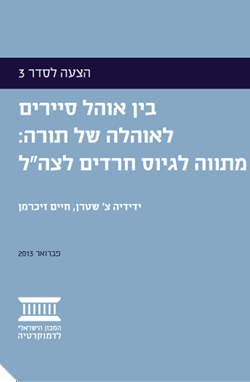A Framework for Ultra-Orthodox Conscription
Motion for the Agenda No. 3
- Written By: Prof. Yedidia Z. Stern, Haim Zicherman
- Publication Date:
- Cover Type: Online Booklet | Hebrew
- Number Of Pages: 72 Pages
- Center: Religion and State Program
IDI's Prof. Yedidia Z. Stern and Attorney Haim Zicherman present a proposal aimed to offer the Knesset an outline of a solution to the issue of conscription of ultra-Orthodox yeshiva students that is designed to withstand a threefold challenge: It must be politically feasible, legally valid, and socially beneficial.
Note that this is one of two IDI proposals to integrate Haredim into the Israeli army. An additional proposal by Profs. Avi Ben-Bassat, Momi Dahan, and Mordechai Kremnitzer can be found here.
The Goal of the Proposal
The exemption of the ultra-Orthodox from military service in the Israel Defense Force has been a matter of great concern in Israeli society for years, and the debate has intensified during the past year. The arrangement that enables yeshiva students to defer conscription, which was initially intended to permit a small group of scholars to pursue advanced Torah study, is currently applied across-the-board to the vast majority of Haredi men of draft age, who constitute some 14% of all males eligible for conscription. A decade ago, the Knesset passed the Tal Law, which was intended to enable the ultra-Orthodox to serve. Recently, however, the High Court of Justice struck down this law because it had failed to achieve its objectives and violated the principle of equality. As a result, the deferments currently enjoyed by nearly 50,000 Haredi men are not anchored in law and await attention from the Defense Ministry and the IDF. While the IDF has refrained from forcibly drafting the ultra-Orthodox, everyone agrees that the situation is problematic and must be resolved as soon as possible.
The combination of a legal vacuum and deep social discord on this issue may spark a fierce conflict between different sectors of Israeli society. Indeed, it appears that a culture war between camps has already begun. The incoming Knesset shoulders the heavy responsibility of proposing a new legal arrangement that will promote equal sharing of the burden of military service and at the same time respect the values and beliefs of the ultra-Orthodox public.
The goal of the current proposal is to offer the Knesset an outline of an appropriate solution to the issue of conscription of ultra-Orthodox yeshiva students. This proposed solution must be able to withstand a threefold challenge: It must be politically feasible, legally valid, and socially beneficial.
- Young Haredi men will be allowed to defer conscription until age 22 so that they can consolidate their ultra-Orthodox identity before beginning military service.
- At age 22, two-thirds of all Haredi men (over 5,000 a year) will be drafted into the IDF (and not into civilian service). This target will be achieved gradually, over a period of six years.
- Ultra-Orthodox soldiers will serve 18–24 months, depending on the nature of their military service. Following their compulsory service, they will serve in the reserves.
- The IDF will encourage 18-year old Haredi men who are interested in combat service to serve in combat units. Similarly, new hesder yeshivot combining combat service with Torah study will be established for Haredi soldiers.
How can this ambitious objective be achieved?
The proposed framework rejects the imposition of criminal sanctions or coercion as a means of enforcing compliance, and leaves the decision of whether or not to serve in the army to each ultra-Orthodox young man. It does, however, define a series of powerful economic incentives, both positive (if the objective is met) and negative (if the objective is not met). Thus, for example, if the annual quotas are not met, the monthly government stipend allocated to ultra-Orthodox yeshiva students will be cut significantly; as long as the quotas are not met, the cuts will increase, until stipends are barely allocated at all. These incentives will apply to individuals, to the yeshiva in which they are enrolled, and to the entire ultra-Orthodox community; that is, the cuts in stipends will apply not only to each institution whose students do not meet the target conscription goal, but also to all married yeshiva students who have reached the conscription age of 22, if the group as a whole has not met the annual goal. The combined force of these incentives will enable achievement of the conscription target. Failure to meet the conscription objectives will lead to a substantial reduction in State transfer payments to ultra-Orthodox institutions, according to a predefined scale, conceivably leading to their closure.
What does Israeli society stand to gain?
Service of young Haredi men in the IDF, in accordance with the proposed framework, stands to unify Israeli society. When every Haredi family has sons in uniform, the sense of solidarity and shared destiny among the various sectors of Israeli society will increase. At the same time, the fact that a third of ultra-Orthodox young men will be able to continue their Torah studies will symbolize the value of Torah study as an expression of the Jewish character of the State of Israel. The proposed plan makes it clear that a balance must be struck between two important values: equality and Torah study.
Acceptance of this plan would allow ultra-Orthodox society to escape the vicious cycle of poverty and dependency in which it is trapped. When the young men of this community complete their military service they will begin vocational studies or enter the workforce. Their employment rate will rise to the level of the employment rate of Israeli society as a whole, jumpstarting a powerful growth engine for the national economy.

